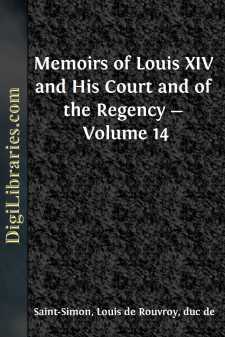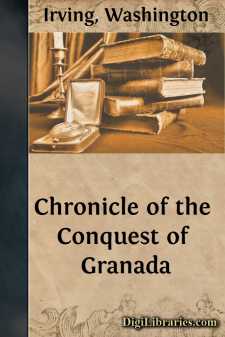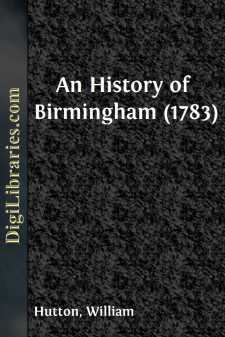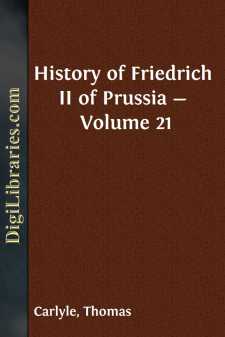History
- Africa 30
- Americas (North Central South West Indies) 50
- Ancient 68
- Asia 58
- Australia & New Zealand 8
- Canada 41
- Caribbean & West Indies 1
- Civilization 20
- Eastern Europe 12
- Europe
- Expeditions & Discoveries 60
- General 77
- Historical Geography 1
- Jewish 9
- Latin America 3
- Medieval 8
- Middle East 13
- Military 248
- Revolutionary 8
- Study & Teaching 5
- United States 353
- Western Europe 56
- World 13
Europe Books
Sort by:
In December, 1651, the Parliament agreed to the following resolution: To send a deputation to the King to inform him of the rumours of Mazarin's return, and to beseech him to confirm the royal promise which he had made to his people upon that head; to forbid all governors to give the Cardinal passage; to desire the King to acquaint the Pope and other Princes with the reasons that had obliged him...
more...
For a long time a species of war had been declared between the King of England and his son, the Prince of Wales, which had caused much scandal; and which had enlisted the Court on one side, and made much stir in the Parliament. George had more than once broken out with indecency against his son; he had long since driven him from the palace, and would not see him. He had so cut down his income that he...
more...
THE Revolution had been accomplished. The decrees of the Convention were everywhere received with submission. London, true during fifty eventful years to the cause of civil freedom and of the reformed religion, was foremost in professing loyalty to the new Sovereigns. Garter King at arms, after making proclamation under the windows of Whitehall, rode in state along the Strand to Temple Bar. He was...
more...
INTRODUCTION. Although the following Chronicle bears the name of the venerable Fray Antonio Agapida, it is rather a superstructure reared upon the fragments which remain of his work. It may be asked, Who is this same Agapida, who is cited with such deference, yet whose name is not to be found in any of the catalogues of Spanish authors? The question is hard to answer. He appears to have been one of the...
more...
by:
Victor Hugo
December 20, 1848 On Thursday, December 20, 1848, the Constituent Assembly, being in session, surrounded at that moment by an imposing display of troops, heard the report of the Representative Waldeck-Rousseau, read on behalf of the committee which had been appointed to scrutinize the votes in the election of President of the Republic; a report in which general attention had marked this phrase, which...
more...
by:
Jacob Abbott
Richard's Predecessors. There have been three monarchs of the name of Richard upon the English throne.Three Richards.Richard the Crusader.Richard I. is known and celebrated in history as Richard the Crusader. He was the sovereign ruler not only of England, but of all the Norman part of France, and from both of his dominions he raised a vast army, and went with it to the Holy Land, where he fought...
more...
by:
William Hutton
AN HISTORY &c. Some account of the derivation of the name of Birmingham. The word Birmingham, is too remote for certain explanation. During the last four centuries it has been variously written Brumwycheham, Bermyngeham, Bromwycham, Burmyngham, Bermyngham, Byrmyngham, and Birmingham; nay, even so late as the seventeenth century it was written Bromicham. Dugdale supposes the name to have been given...
more...
by:
Thomas Carlyle
Chapter I.—PREFATORY. The Twelve Hercules-labors of this King have ended here; what was required of him in World-History is accomplished. There remain to Friedrich Twenty-three Years more of Life, which to Prussian History are as full of importance as ever; but do not essentially concern European History, Europe having gone the road we now see it in. On the grand World-Theatre the curtain has fallen...
more...
by:
Edward Farr
WAR WITH SPAIN. The year had not closed before the ministers found that a rupture with Spain was inevitable. The first intimation of it was detected in the menacing conduct of the court of Versailles; and Lord Bristol, the English ambassador at Madrid, was instructed to demand the real intentions of Charles III., and the real purport of the family compact. General Wall, the Spanish minister replied...
more...
by:
Anthony Hamilton
The accounts prefixed to the different editions of his works, down to the year 1805, are very imperfect; in that year a new, and, in general, far better edition than any of the preceding ones, was published in Paris, to which a sketch of his life was also added; but it contains rather just criticisms on his works, than any very novel or satisfactory anecdote concerning himself. It is not pretended here...
more...


![The Memoirs of Cardinal de Retz - Volume 4 [Historic court memoirs]](https://digilibraries-com.s3.eu-central-1.amazonaws.com/covers/1a07b218-3a0c-4524-9595-7102796947bc.jpg)








